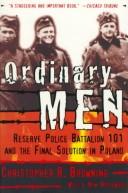Check nearby libraries
Buy this book

In the early hours of July 13, 1942, the men of Reserve Police Battalion 101, a unit of the German Order Police, entered the Polish Village of Jozefow. They had arrived in Poland less than three weeks before, most of them recently drafted family men too old for combat service--workers, artisans, salesmen, and clerks. By nightfall, they had rounded up Jozefow's 1,800 Jews, selected several hundred men as "work Jews," and shot the rest--that is, some 1,500 women, children, and old people.
Most of these overage, rear-echelon reserve policemen had grown to maturity in the port city of Hamburg in pre-Hitler Germany and were neither committed Nazis nor racial fanatics.
Nevertheless, in the sixteen months from the Jozefow massacre to the brutal Erntefest ("harvest festival") slaughter of November 1943, these average men participated in the direct shooting deaths of at least 38,000 Jews and the deportation to Treblinka's gas chambers of 45,000 more--a total body count of 83,000 for a unit of less than 500 men.
Drawing on postwar interrogations of 210 former members of the battalion, Christopher Browning lets them speak for themselves about their contribution to the Final Solution--what they did, what they thought, how they rationalized their behavior (one man would shoot only infants and children, to "release" them from their misery).
In a sobering conclusion, Browning suggests that these good Germans were acting less out of deference to authority or fear of punishment than from motives as insidious as they are common: careerism and peer pressure.
With its unflinching reconstruction of the battalion's murderous record and its painstaking attention to the social background and actions of individual men, this unique account offers some of the most powerful and disturbing evidence to date of the ordinary human capacity for extraordinary inhumanity.
Check nearby libraries
Buy this book

Previews available in: English
Subjects
Germany, Germany. Reserve-Polizei-Bataillon 101, Nationalsozialistische Deutsche Arbeiter-Partei, Nationalsozialistische Deutsche Arbeiter-partei. Reservepolizeibataillon, World War, 1939-1945, German Personal narratives, War criminals, Nationalsozialistische Deutsche Arbeiter-Partei. Reservepolizeibataillon 101, Holocaust, Jewish (1939-1945), Atrocities, Genocide, World war, 1939-1945, poland, Jews, poland, Holocaust, Soldaten, Judenverfolgung, Judenvernichtung, Förintelsen, Andra världskriget 1939-1945, Personliga berättelser, tyska, Krigsförbrytelser, Grymheter, Holocaust, 1939-1945, Deutschland Reserve-Polizei-Bataillon, Deutschland, Pariser Friedenskonferenz 1919-1920 Paris Polish Delegation gnd, World war, 1939-1945, personal narratives, german, World war, 1939-1945, atrocities, Germany, armed forces, Personal narratives, German, Holocaust, Jewish (1939-1945) -- Poland, World War, 1939-1945 -- Personal narratives, German, War criminals -- Germany, World War, 1939-1945 -- Atrocities, New York Times reviewed, Juifs, Extermination (1941-1945), Guerre mondiale (1939-1945), Atrocités, Criminels de guerre allemands, Guerre mondiale, 1939-1945, Holocauste, 1939-1945, Criminels de guerre, Extermination (1939-1945), Génocide, Document, Juif, Allemagne. Ordnungspolizei, Allemagne, Deutschland / Reserve-Polizei-Bataillon <101>, HISTORY / Military / World War II, HISTORY / Europe / Poland, HISTORY / Holocaust, Holocaust, Jewish (1939-1945) fast (OCoLC)fst00958866, World War (1939-1945) fast (OCoLC)fst01180924, Nationalsozialistische deutsche arbeiter-partei. reservepolizeibataillon 101., Holocaust, jewish (1939-1945)--poland, World war, 1939-1945--personal narratives, german, War criminals--germany, World war, 1939-1945--atrocities, D804.3 .b77 1992, 940.53/18Showing 3 featured editions. View all 19 editions?
| Edition | Availability |
|---|---|
|
1
Ordinary men: Reserve Police Battalion 101 and the final solution in Poland
1998, HarperPerennial
in English
- 1st HarperPerennial ed., Reissued [with a new afterword by the author]
0060995068 9780060995065
|
eeee
Libraries near you:
WorldCat
|
| 2 |
cccc
Libraries near you:
WorldCat
|
|
3
Ordinary men: Reserve Police Battalion 101 and the final solution in Poland
1992, HarperCollins
in English
- 1st ed.
0060190132 9780060190132
|
aaaa
Libraries near you:
WorldCat
|
Book Details
Edition Notes
Includes bibliographical references (p. 193-218) and index.
"Aaron Asher books."
Classifications
The Physical Object
ID Numbers
Source records
Scriblio MARC recordIthaca College Library MARC record
University of Prince Edward Island MARC record
Internet Archive item record
Internet Archive item record
marc_openlibraries_phillipsacademy MARC record
marc_openlibraries_sanfranciscopubliclibrary MARC record
Library of Congress MARC record
Internet Archive item record
Better World Books record
marc_columbia MARC record
marc_columbia MARC record
Work Description
Christopher R. Browning’s shocking account of how a unit of average middle-aged Germans became the cold-blooded murderers of tens of thousands of Jews.
Ordinary Men is the true story of Reserve Police Battalion 101 of the German Order Police, which was responsible for mass shootings as well as round-ups of Jewish people for deportation to Nazi death camps in Poland in 1942. Browning argues that most of the men of RPB 101 were not fanatical Nazis but, rather, ordinary middle-aged, working-class men who committed these atrocities out of a mixture of motives, including the group dynamics of conformity, deference to authority, role adaptation, and the altering of moral norms to justify their actions. Very quickly three groups emerged within the battalion: a core of eager killers, a plurality who carried out their duties reliably but without initiative, and a small minority who evaded participation in the acts of killing without diminishing the murderous efficiency of the battalion whatsoever.
While this book discusses a specific Reserve Unit during WWII, the general argument Browning makes is that most people succumb to the pressures of a group setting and commit actions they would never do of their own volition.
Ordinary Men is a powerful, chilling, and important work, with themes and arguments that continue to resonate today.
Links outside Open Library
Community Reviews (1)
Feedback?| July 18, 2024 | Edited by MARC Bot | import existing book |
| December 19, 2023 | Edited by ImportBot | import existing book |
| December 12, 2023 | Edited by dcapillae | fix author |
| December 12, 2023 | Edited by dcapillae | Merge works |
| October 17, 2009 | Created by WorkBot | add works page |















